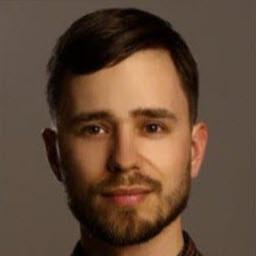
Student insights - the Hitachi Energy and District C technical writing initiative
In 2023, the Technical Writing Team at Hitachi Energy in Kraków participated in District C, a project run by the University of North Carolina Wilmington (UNCW) to inspire the next generation of energy professionals. This project was a perfect storm of teamwork, where the Hitachi Energy employees gave the students the glimpses of the day-to-day experiences of documentation developers. The collaboration provided valuable insights into technical writing, cross-cultural teamwork, and continuous improvement, which makes this story a compelling read for those interested in education, design thinking, or professional development.
Introduction
District C lets students explore a real-life company's business operations. They learn about the unique aspects of an industry hands-on. In the end, students offer practical advice to the given problem during a pitch meeting, often their first experience presenting a business case to stakeholders. Read the story of the collaboration between District C and Hitachi Energy in Kraków. The story is told by Andrzej, on behalf of the Technical Writing Team.
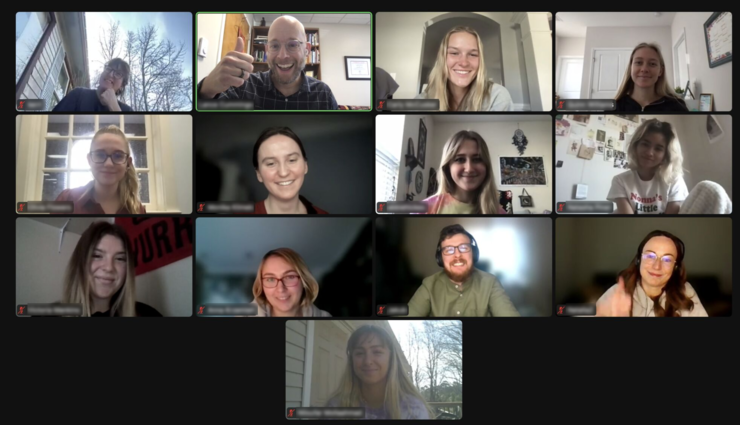 Participants brainstorming over Zoom.
Participants brainstorming over Zoom.
The participants
In 2023, our Technical Writing Team consisted of four people, two of whom were new joiners. Each of us had a different set of experiences and knowledge to share. It was in our best interest to think about how to collaborate better and align our efforts.
We were happy to exchange thoughts with a group of American students of English Studies at UNCW and the Polish post-graduate students taking a technical writing course at the Vistula non-public university. The students participating in the project could interview the Technical Writing Team about our team's role at Hitachi Energy. They used design thinking principles to examine our work environment, aiming to analyze, find opportunities, gather suggestions, and present them. All of that happened under the watchful eye of Dr. Lance Cummings, an English professor who specializes in applying AI in the realm of writing. He was the originator of this unusual project.
Intricacies of technical writing
We shared our experiences that gave the students an idea of what makes technical writing rewarding and challenging:
- Processing high volume of information
- Gathering insights from experts and seeking feedback
- Building knowledge about complex products and systems developed at Hitachi Energy
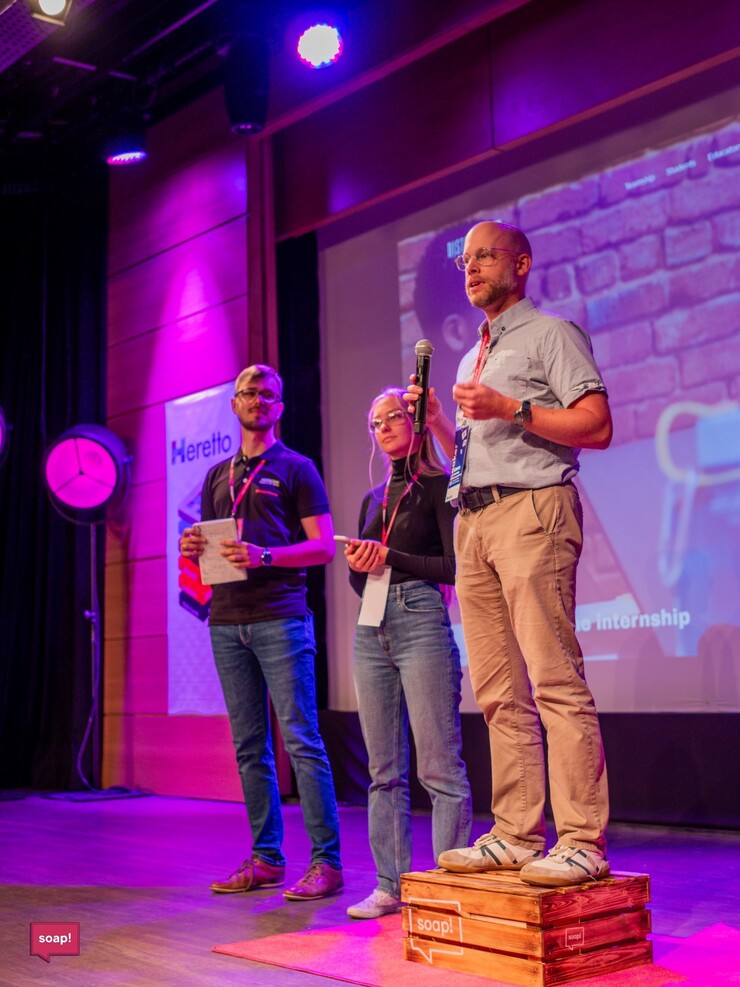 Lance, Quinn, and Andrzej telling a story about the
project at the
soap! content conference
in June 2023.
Lance, Quinn, and Andrzej telling a story about the
project at the
soap! content conference
in June 2023.
Project execution
First, there were two rounds of Zoom meetings where information was shared.
The members of the Hitachi Energy Team explained what it is like to be a Technical Writer and why this role requires specialized expertise. Concise and clear data gave insight into the organization's daily work and critical focus areas.
Then, students reflected on what was said and came back with additional questions to dig deeper. Each student group had a specific amount of time to ask strategic questions. These were intense, focused sessions in which both sides tried to use the available time as best they could.
This exercise had already proven beneficial to the Hitachi Energy Team. We all knew the specifics of our daily operations well. Still, it was a useful exercise to describe our role to someone outside of our working environment. Explaining without relying on jargon, project names, and mental shortcuts was challenging. It helped us to reflect on our needs and better understand them by clear formulation.
The big event
Student groups learned what operating in a modern global corporate workplace is like. They gathered input, applied design thinking principles, identified opportunities for growth, and suggested sound solutions, which were then presented during the final pitch meeting held over Zoom.
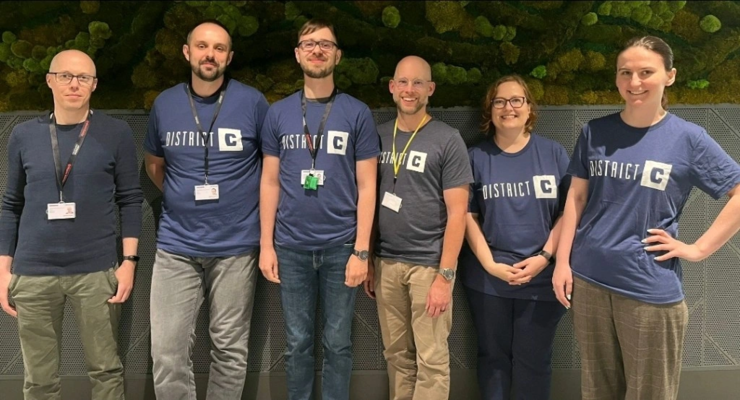 Proud contributors of the District C initiative.
Proud contributors of the District C initiative.
Pitch meeting is a presentation where an individual or a team presents a business idea or concept to potential investors, stakeholders, or clients to secure funding, support, or interest in the project. The presentation usually includes an overview of the product or service and the proposed solution.
Recommendations
Each group presented its assessment of the opportunities and provided practical recommendations. Fresh perspectives and solutions were appreciated, as they logically tied to the identified areas for improvement. At the same time, the Hitachi Energy Team offered practical feedback that was rooted in business operations, experience, and practice.
Students focused mainly on the nature of the interactions between the Technical Writers and the Subject Matter Experts (SMEs).
They then explored questions such as: "What is the most efficient way to get insights from an SME and build product knowledge?" and "Are multiple team members often asked the same questions?".
One suggestion was to invite all SMEs to a single session to get all their answers. Alternatively, this could be resolved asynchronously through Teams or a survey.
Other recommendations included:
- Conducting dedicated workshops to get product insights
- Incorporating short videos to distribute knowledge and information
- Using Scrum Master's advice to optimize the collaboration between the Tech Writers and the Dev team
- Establishing a more formalized review process
The takeaways
Though we have not used every recommendation, we gained a clearer picture of our needs and possibilities. The challenge allowed for the analysis of how we operate on a daily basis. It emphasized the strategic and business objectives that are key to the effectiveness of the processes we run in Kraków and the global organization.
As part of continuous improvement, we regularly reevaluate our approach to documentation process and collaboration. Even a year later, we still actively use the good ideas we picked up during the District C project.
For example, District C inspired us to try Microsoft Loop to engage multiple Subject Matter Experts quickly.
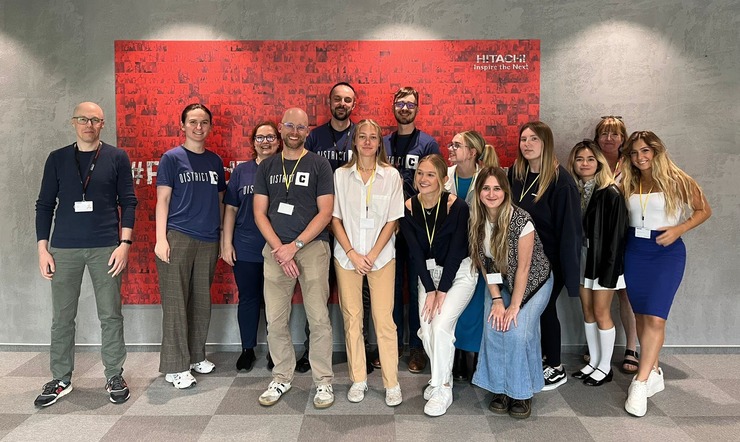 Happy participants at the Hitachi Energy Office in
Kraków.
Happy participants at the Hitachi Energy Office in
Kraków.
The cross-cultural collaboration aspect
It is worth emphasizing the international nature of this project. To gain insights into this aspect, shortly after the project was completed, we met the US participants in the Kraków office and asked about their experiences.
The American view by Quinn Williams:
This program was especially helpful in understanding how different people with different backgrounds can approach business issues. We got to work with Polish students, and sharing ideas required us to keep our communication skills at the forefront. If we had not practiced effective communication, we would not have successfully conveyed some implied thoughts from our American point of view. This foundation helped us understand the importance of creating a strong team bond and interpersonal practices.
I also enjoyed experiencing the program's professional side, where we communicated with the Hitachi Energy team members. It was interesting to see where the Polish work culture differed from the American culture and where there was an overlap. I think our teams were able to use essential pieces from both sides to create an effective workflow.
We also received insights from the Polish perspective, provided by Monika Dąbrowska, a participant in the technical writing postgraduate studies at Vistula non-public university:
What I particularly liked about District C was that we could exchange our experiences regarding learning and creating projects. The Polish education system and culture lead to a general mindset somewhat contrasting that of American students.
Also, the American view of the Poles is far from what we showed during the project. Similarly, the Poles also have certain misconceptions about the Americans. These assumptions and presuppositions were discussed and challenged during our cooperation, and we found power in our variety, creativity, exchanging experiences, and understanding one another.
The Technical Writing Team was happy to meet and get to know the US participants during their visit to the Kraków office and at the soap! content conference, where we also met some of the Polish students. After the intense cooperation, bonding during that event was fun.
Conclusion
The collaboration between Hitachi Energy and District C was a truly enlightening experience. Students gained a deeper understanding of the technical writing profession and the complexities of the energy sector. They provided valuable recommendations to improve collaboration between Technical Writers and SMEs, such as conducting dedicated workshops and using short videos for knowledge distribution.
The project also highlighted the benefits of cross-cultural collaboration, with American and Polish participants gaining insights into different work cultures and communication styles.
The Hitachi Energy Team benefited from the fresh perspectives and practical solutions provided by the students, emphasizing the importance of continuous improvement. The ongoing impact of the collaboration is evident in the continued use of some recommendations, such as using Microsoft Loop to engage multiple SMEs quickly.
We are grateful to the students willing to listen to our stories and support us, the practitioners of the obscure art of tech writing. One can always count on the students to come up with fresh ideas! They were bright, open-minded, and not burdened with presumptions. We wish you all the best!
And thank you, Dr. Cummings, for creating such a fruitful initiative — we really enjoyed being a part of it.
The 2024 edition and prospects
In 2024, District C returned to Hitachi Energy. This time, it was led by Karolina Harazim, our Internal Communications Senior Specialist, and supported by the Technical Writing Team.
Something tells us this wasn't the last time Hitachi Energy collaborated with the University of North Carolina Wilmington. Until the next time!
Additional information about District C
The District C program at UNCW (English Studies) aims to introduce students to diverse career paths and opportunities while providing valuable real-world experience collaborating with international companies. As an English professor and a certified District C coach, Dr. Lance Cummings has been instrumental in connecting his students with the vibrant tech writing community in Kraków, Poland.
For more information about the program, visit the official District C website.
Would you be interested in participating in a similar initiative? If so, get in touch with Dr. Lance Cummings.
